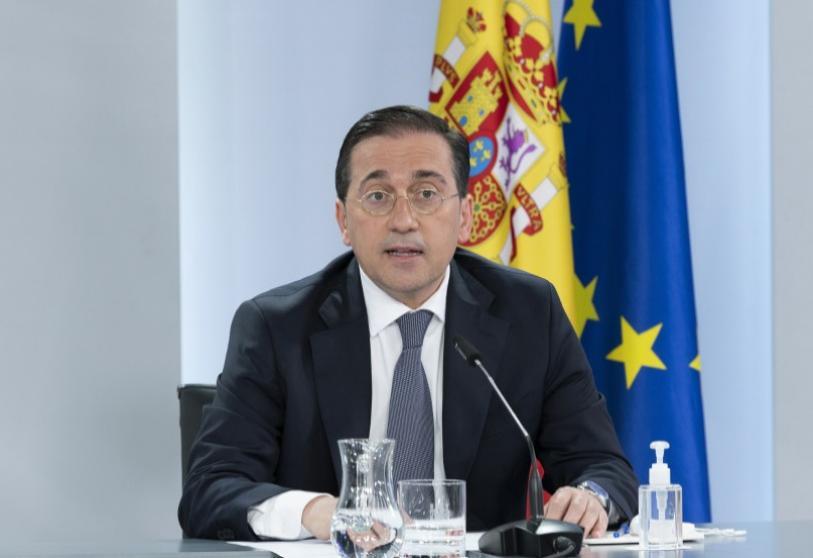José Manuel Albares positively highlighted the new Spanish-Moroccan relationship after the last High Level Meeting before the Foreign Affairs Committee of the Congress of Deputies
Spain and Morocco currently enjoy a solid diplomatic relationship. This was evidenced by the various memorandums of cooperation in different sectors signed after the last High Level Meeting held in Rabat in the presence of the Spanish President of the Government, Pedro Sánchez, and the Moroccan Head of Government, Aziz Akhannouch.
José Manuel Albares, the Spanish Minister of Foreign Affairs, defended before the Spanish Congress Foreign Affairs Committee the new Spanish-Moroccan relationship established after the last High-Level Meeting held in the Rabat capital, which led to agreements on various matters and sectors of importance for the European and North African countries, such as security and the fight against terrorism, migration, trade, education, etc…..
The Spanish minister pointed out that this link is based on important pillars such as the fight against terrorism and migration control, two very important issues for both nations at this time. The fight against extremist jihadism has always been an issue on which both countries have worked closely together, even at times when relations were not as good as they are now. This cooperation has served to dismantle several terrorist cells in recent months. On the other hand, migration control and the regularisation of border transit has already benefited thousands of people from Ceuta, Melilla, the Canary Islands, Andalusia and, of course, Morocco. As for irregular immigration, Albares pointed out that in January 2023 arrivals were reduced by 69% in Andalusia and 82% in the Canary Islands, compared to the same month in 2022. “That’s thousands of lives being saved. The reduction in illegal immigration is saving thousands of lives and we are trying to encourage asylum requests by those who are in a position to do so”, the Spanish minister explained in statements reported by various media such as Rue 20 and 20 Minutos.

The economic plane is also substantial for both neighbours, José Manuel Albares also pointed out in his appearance that the economic agreements have made it possible to lay the foundations for mutual economic development, something vital bearing in mind that 1,100 Spanish SMEs have set up in Morocco and bilateral trade has increased by 12 billion euros, as the Spanish Minister of Foreign Affairs explained. “The foundations have been laid for Spanish companies to access Morocco’s investment plan”, Albares explained. With regard to cultural and educational collaboration, the Spanish Foreign Affairs Minister stressed that “bilingual sections are being opened” and “reinforcing the teaching of Spanish in up to 100 schools and creating for the first time a Spanish public high school in Rabat”.
This current situation of concord was reached after a diplomatic relationship that had gone through difficult moments of disagreement after Spain allowed Polisario Front leader Brahim Ghali to enter its territory in April 2021 to be treated for a respiratory ailment in a hospital in Logroño. The Moroccan kingdom denounced the lack of information and cooperation on the Spanish side, and from then on, tense situations ensued, such as the entry of thousands of illegal immigrants from Moroccan territory through the Ceuta border or the withdrawal of the Moroccan ambassador from Madrid.

Spain tried to redirect the situation with political moves such as the conciliatory messages of King Felipe VI and the appointment of José Manuel Albares as Foreign Minister to replace Arancha González Laya, who was marked by the Ghali case. However, the decisive move came with the Spanish government’s recognition of the Moroccan initiative for Western Sahara as the “most serious, credible and realistic” way to resolve the conflict over the Sahrawi territory.
Following this recognition of an issue of vital importance to Morocco, King Mohammed VI invited President Pedro Sánchez to a reception in Rabat in the middle of Ramadan in April 2022, and the road map was established on which the diplomatic relationship between the two countries is based, leading to the High Level Meeting held, which served to initial many agreements on different matters that benefit both countries.
On the subject of Western Sahara, José Manuel Albares stated that Spain fully supports the work of Staffan de Mistura, the United Nations (UN) special envoy for Western Sahara, who is seeking a political and agreed solution to the problem in the Saharawi territory. All this after Spain made it clear that it supports Morocco’s proposal as the “most serious, credible and realistic” way to solve a problem that has lasted more than four decades.

Morocco proposes a formula of broad autonomy for Western Sahara under Moroccan sovereignty, respecting UN resolutions. This initiative enjoys significant international support, including from the United States, the United Arab Emirates, Germany and Spain itself. This is in contrast to the Polisario Front’s proposal to hold a referendum on independence among the Sahrawi population, which has less support, including that of Algeria, a major political enemy of the Moroccan kingdom in the Maghreb.
On the question of Western Sahara, José Manuel Albares argued that Spain is “with the United Nations”. Albares aligned himself completely with the UN on the Saharawi dispute and showed his great involvement in the matter: ‘I am the first Foreign Minister in the world to have met with the Secretary of the United Nations, Antonio Guterres, for the Sahara’, as various media outlets such as 20 minutos and Rue 20 reported.
Source: Ata Layar

















Add Comment